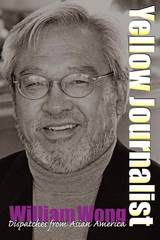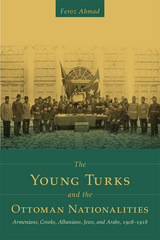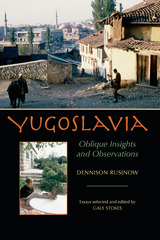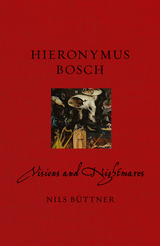728 books about Ethnic relations and 3
start with Y
728 books about Ethnic relations and 3
728 books about Ethnic relations
3 start with Y start with Y
3 start with Y start with Y

Yellow Journalist
Dispatches from Asian America
William Wong
Temple University Press, 2001
"For three decades, William Wong has been America's most energetic and entertaining chronicler of the Asian diaspora and its effects on politics, culture, business, sports, dress, diet, and language. Like other great humorists, he exposes the painful absurdities that plague each new wave of immigrant families as they enrich the national character, from Wong's own adventurous parents to Tiger Woods. Some of these pieces offer surprising insights on geopolitics and others explore the legal and social consequences of racial discrimination, but my favorites are the playful essays, including the classic 'So That's Why I Can't Lose Weight.' "
--Jay Mathews, Washington Post reporter and columnist, and author of Class Struggle
Who are Asian Americans? Are they the remnants of the "yellow peril" portrayed in the media through stories on Asian street gangs, unscrupulous political fundraisers, and crafty nuclear spies? Or are they the "model minority" that the media present as consistently outranking European Americans in math scores and violin performances?
In this funny, sobering, and always enlightening collection, journalist William Wong comments on these and other anomalies of the Asian American experience. From its opening tribute to the Oakland Chinatown of Wong's childhood to its closing tribute to Tiger Woods, Yellow Journalist portrays the many-sided legacies of exclusion and discrimination. The stories, columns, essays, and commentaries in this collection tackle such persistent problems as media racism, criminality, inter-ethnic tensions, and political marginalization. As a group, they make a strong case for the centrality of the Asian American historical experiences in U.S. race relations.
The essays cover many subjects, from the personal to policy, from the serious to the silly. You will learn a little Asian American history and a lot about the nuances and complexities of the contemporary Asian American experience. If there is an overriding theme of these stories and essays, it is the multi-faceted adaptation of ethnic Asians to the common American culture, the intriguing roles that they play in our society, and the quality of their achievements to contribute to a better society.
Bill Wong's high school journalism teacher took him aside during his senior year and told him he would have to be "twice as good" to succeed at his chosen profession. Succeed he did, and "twice as good" he is. As Darrell Hamamoto remarks in his Foreword, "'Chinaman,' Chinese American, Asian American; any way you slice it, Bill Wong is one straight-up righteous Yellow Man."
"One of the advantages of having a writer of Bill Wong's talent around is that we don't have to depend upon intermediaries and go-betweens to give us insights about issues affecting Asian-Americans. He is often entertaining, and ironic, but underneath it all is a serious mind devoted to shattering myths about one of our fastest growing minorities."
--Ishmael Reed, author of The Reed Reader
"It is about time that America meet William Wong--an icon in journalism whose experience as a second generation Chinese-American has given him a unique lens through which life in America can be examined. For almost two decades, his columns in the Oakland Tribune and other San Francisco bay area newspapers have captured a different kind of reality about some of our most important social, cultural, and political moments. Wong's readiness to share his family, his community, and his conscience allows readers to cross a bridge into the world of Asian America. Whether it is an analysis of the 1996 campaign finance scandals or a perspective on how parent pressures and bi-cultural conflicts can play out in a young Asian American teen's life, Wong's skillful weaving of humor, irony, and poignant portrayals of the circumstances make each story linger long past the final sentence of his essay."
--Angela E. Oh, Lecturer/Former Advisory Board Member, President's Initiative on Race
"...an anthology of Wong's best writing from the last decade and a half, covering an impressive array of topics and tone."
--Asianweek
[more]

The Young Turks and the Ottoman Nationalities
Armenians, Greeks, Albanians, Jews, and Arabs, 1908–1918
Feroz Ahmad
University of Utah Press, 2014
The years 1908 to 1918 are frequently viewed as the period when the Ottoman Empire fell into decline, but in this volume, Feroz Ahmad argues that the Empire was not in decline but instead had come face to face with a widespread process of decolonization. Its colonies, stimulated by the idea of nationalism, sought to liberate themselves, sometimes with the help of the Great Powers of Europe, who in turn saw these rebellions as an opportunity to expand their own empires. While these ethno-nationalist movements have often been described in terms of Ottoman oppressor versus conspiring nationalists, here they are presented as part of a broad historical process.
Ahmad holds that nationalism was introduced into the Ottoman Empire during the French Revolution, providing kindling for the struggles that later emerged. Setting the stage with this nineteenth-century background, Ahmad then examines each Ottoman nationality in the wake of the restoration of the Ottoman constitution in 1908. Officially known as the Committee of Union and Progress (CUP), the Young Turks made up a nationalist political party that ruled the Ottoman Empire from 1908 until the end of World War I. Ahmad illuminates the relationships and conflicts between the Young Turks and the Greek, Armenian, Albanian, Jewish, and Arab ethnic groups during this period. Placing these nationalities in their historical context, he shows their relationships not only to the Young Turks but also to one anotherno other single book has attempted to look closely at all of these connections.
Anyone interested in understanding the roots of current-day relations in the Balkans and Middle East will find this book very informative. Clearly organized and written, the book will enlighten both readers and scholars.
Ahmad holds that nationalism was introduced into the Ottoman Empire during the French Revolution, providing kindling for the struggles that later emerged. Setting the stage with this nineteenth-century background, Ahmad then examines each Ottoman nationality in the wake of the restoration of the Ottoman constitution in 1908. Officially known as the Committee of Union and Progress (CUP), the Young Turks made up a nationalist political party that ruled the Ottoman Empire from 1908 until the end of World War I. Ahmad illuminates the relationships and conflicts between the Young Turks and the Greek, Armenian, Albanian, Jewish, and Arab ethnic groups during this period. Placing these nationalities in their historical context, he shows their relationships not only to the Young Turks but also to one anotherno other single book has attempted to look closely at all of these connections.
Anyone interested in understanding the roots of current-day relations in the Balkans and Middle East will find this book very informative. Clearly organized and written, the book will enlighten both readers and scholars.
[more]

Yugoslavia
Oblique Insights and Observations
Dennison Rusinow
University of Pittsburgh Press, 2008
Defying Stalin and his brand of communism, Tito's Yugoslavia developed a unique kind of socialism that combined one-party rule with an economic system of workers' self-management that aroused intense interest throughout the Cold War. As a member of the American Universities Field Staff, Dennison Rusinow became a long-time resident and frequent visitor to Yugoslavia. This volume presents the most significant of his refreshingly immediate and well-informed reports on life in Yugoslavia and the country's major political developments.
Rusinow's essays explore such diverse topics as the first American-style supermarket and its challenge to traditional outdoor markets; the lessons of a Serbian holiday feast (Slava); the resignation of vice president Rankovic; the Croatian Spring of 1971; ethnic divides and the rise of nationalism throughout the country; the tension between conservative and liberal forces in Yugoslav politics; and the student revolt at Belgrade University in 1968. Rusinow's final report in 1991 examines the serious challenges to the nation's future even as it collapsed.
Rusinow's essays explore such diverse topics as the first American-style supermarket and its challenge to traditional outdoor markets; the lessons of a Serbian holiday feast (Slava); the resignation of vice president Rankovic; the Croatian Spring of 1971; ethnic divides and the rise of nationalism throughout the country; the tension between conservative and liberal forces in Yugoslav politics; and the student revolt at Belgrade University in 1968. Rusinow's final report in 1991 examines the serious challenges to the nation's future even as it collapsed.
[more]
READERS
Browse our collection.
PUBLISHERS
See BiblioVault's publisher services.
STUDENT SERVICES
Files for college accessibility offices.
UChicago Accessibility Resources
home | accessibility | search | about | contact us
BiblioVault ® 2001 - 2024
The University of Chicago Press









